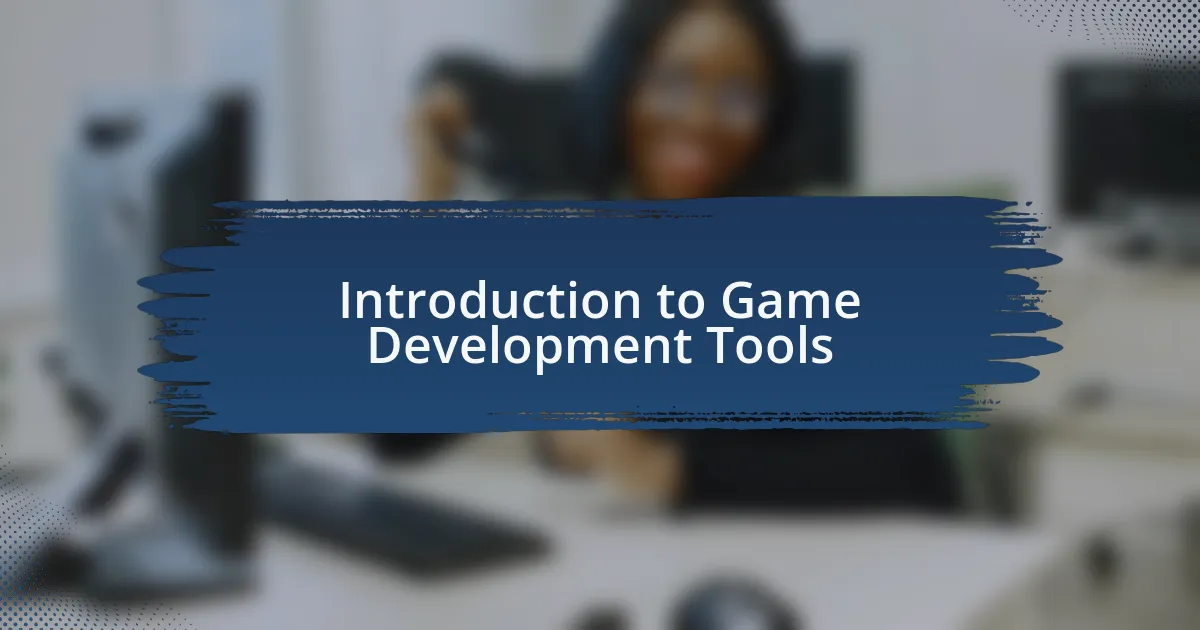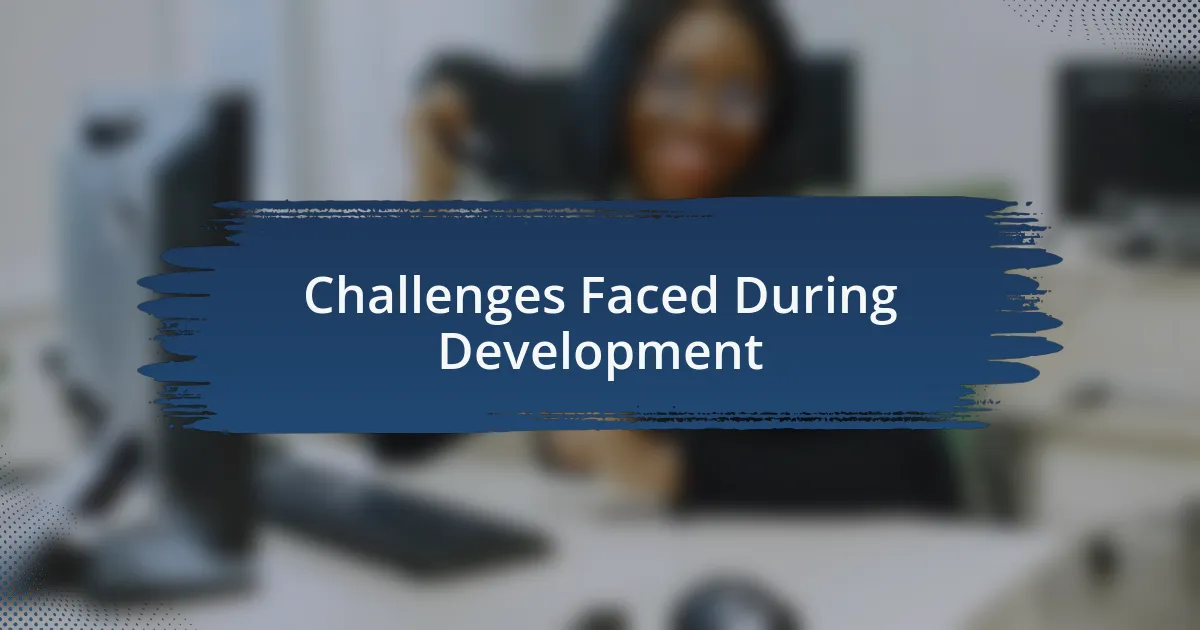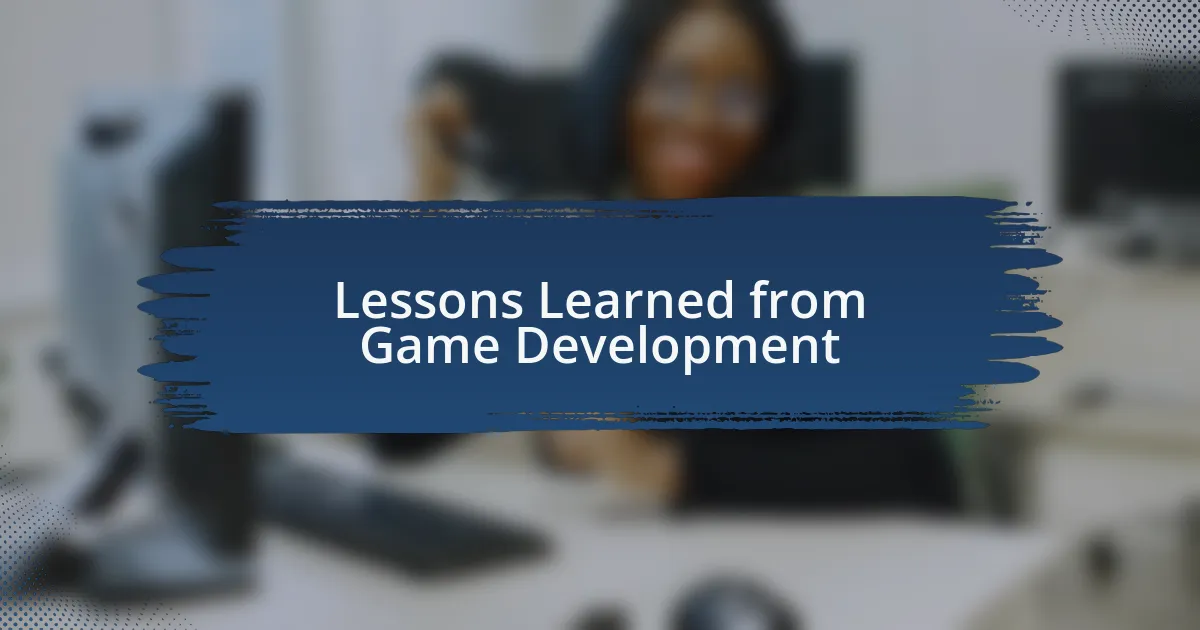Key takeaways:
- The right game development tool can significantly enhance creativity and productivity, with Unity and Unreal Engine being notable examples.
- Technical challenges, such as asset compatibility and performance optimization, are common in game development and offer valuable learning experiences.
- Iteration and constructive feedback are essential for growth, highlighting the importance of user testing and adaptability in design.
- Collaboration can lead to innovative solutions and improvements, showcasing the power of shared ideas in the creative process.

Introduction to Game Development Tools
When I first dove into the world of game development, the sheer variety of tools available was both exhilarating and overwhelming. Each tool seemed to promise a new avenue for creativity, yet I often wondered which one would truly unleash my potential. After experimenting with several, I quickly realized that the right game development tool can make or break the entire creative process.
In my journey, I encountered tools ranging from user-friendly platforms like Unity to more complex ones like Unreal Engine, each catering to different skill levels and project types. Unity, for example, felt like a playground where I could easily prototype my ideas. I remember the thrill of seeing my first character move across the screen; it ignited a passion in me that I hadn’t anticipated.
Choosing the right game development tools is crucial, but it’s also deeply personal. Have you ever felt that spark when a tool clicks perfectly with your workflow? I still vividly recall my first experience with a simple sprite editor. The joy I felt creating pixel art was akin to a child experiencing their first art set—everything felt possible. In a landscape so rich with options, embracing the tools that resonate with you can truly elevate your game development journey.

Overview of Tools I Used
When it comes to game development tools, I found myself gravitating towards a mix of simplicity and power. For instance, I spent countless late nights using GameMaker Studio. It was refreshing to watch my ideas come to life with minimal coding required. The drag-and-drop interface felt like playing with building blocks, which made the process both enjoyable and less intimidating.
Another standout for me was Visual Studio, particularly when it came to scripting in C#. I remember how daunting the first lines of code seemed, but as I began to understand the language, it transformed my understanding of game mechanics. Those moments of debugging—though sometimes frustrating—often led to the greatest breakthroughs. Have you ever had that eureka moment when a piece of code finally works? It’s a rush like no other, and I cherish those experiences.
Finally, I can’t overlook tools like Blender for 3D modeling. While it had a steep learning curve, the satisfaction of creating a detailed character model was incredibly rewarding. I recall spending hours just tweaking textures and lighting. It felt like breathing life into my creations, and that level of engagement kept me motivated. Each of these tools, whether simple or sophisticated, has played a significant role in shaping my game development journey and helping me grow as a creator.

Detailed Experience with Unity
Detailed Experience with Unity
Unity has been a game-changer in my development journey. I vividly remember my first project, a simple platformer where I experimented with physics and animations. Watching my character spring off platforms and collide with obstacles was exhilarating, and I realized how intuitive the interface truly is. Have you ever felt that surge of excitement when you see your vision materialize on screen? For me, that was the moment I knew Unity was my canvas.
As I delved deeper into the platform, the versatility of Unity’s asset store amazed me. I found countless pre-made assets that saved me time and elevated my projects. One of my favorite experiences was integrating a third-party character controller. I had my reservations at first—would it mesh well with my unique gameplay style? The moment I saw it work seamlessly with my design, I felt a wave of relief and satisfaction. It was an affirmation that I could create without starting from scratch, giving me more time to innovate.
There were times when the learning curve felt daunting, especially when tackling C# scripts in Unity. I recall spending hours troubleshooting a bug that seemed to appear out of nowhere. In that moment of frustration, I learned the importance of patience and persistence. Solving that issue was like unraveling a puzzle, and when the game finally ran smoothly, I couldn’t help but reflect on how each challenge only deepened my understanding. How often do we overlook the value of struggle in our creative processes? In retrospect, those struggles shaped my growth as a developer, making every success feel even more rewarding.

Benefits of Using Unreal Engine
Unreal Engine has brought a sense of hyper-realism to my projects that I simply couldn’t achieve with other tools. I recall one project where I sculpted a lush forest. The way the foliage swayed gently with the breeze and the sunlight filtered down through the trees was breathtaking. Have you ever stood in awe of your own creation and felt a deep connection to the environment? That’s the power of Unreal’s graphical capabilities—I could almost hear the leaves rustling.
Another standout feature is the Blueprint visual scripting system. Initially, I was intimidated, thinking that programming would elude me. But as I started to drag and drop nodes, I was amazed at how quickly my ideas transformed into functionality. That moment of realization, where I understood that I didn’t need to be a code wizard to create complex interactions, was liberating. It made me wonder—how many creatives shy away from development because they think it’s beyond their reach?
The community support around Unreal Engine is vibrant and invaluable. I often found myself diving into forums or tutorial videos when I hit a snag. One instance was when I struggled to optimize my game for smoother performance. With just a few clicks, I connected with developers who shared insights that completely turned my project around. It made me grateful to be part of a community where sharing knowledge is the norm. After all, isn’t collaboration one of the best parts of being a developer?

Challenges Faced During Development
As I dove deeper into game development with Unreal Engine, I quickly discovered that technical challenges were ever-present. One notable experience was during the asset integration phase when I faced compatibility issues with 3D models I had purchased. I remember staring at the error messages, feeling a mix of frustration and confusion. Have you ever wished for a simple solution to a complex problem? In those moments, I had to remind myself that troubleshooting is part of the creative journey, leading to valuable learning experiences.
Another challenge arose from the need to balance performance and quality. I recall a particular instance when I wanted to enhance the visual fidelity of my landscape. However, during playtesting, the frame rates plummeted. It became a difficult decision: should I compromise on quality for smoother gameplay, or find a way to optimize without losing the essence of my vision? I learned that being a game developer often means navigating tough trade-offs, which ultimately shapes the final experience for players.
Lastly, I encountered the intricacies of game mechanics design. One of my projects attempted to implement a complex user interface, which resulted in unexpected gameplay issues. I vividly remember the feeling of dismay when playtesters struggled to understand how to interact with the game. It made me question: how can I create an intuitive experience without oversimplifying? This challenge taught me the importance of user feedback and iteration. Each setback became an opportunity to refine my work and enhance the player’s journey.

Lessons Learned from Game Development
Throughout my journey in game development, I’ve realized that iteration is key. I remember a specific moment when I created a character model that I was incredibly proud of. Yet, after receiving feedback during a beta test, I felt deflated. Players found the character hard to relate to. This feedback pushed me to rethink my design approach, reinforcing that constructive criticism is essential for growth. Have you ever felt attached to something only to realize it wasn’t quite right?
Another lesson came when I learned the significance of clear documentation. In the heat of development, I often neglected to jot down design decisions or code changes. I recall a late-night debugging session that turned into a rabbit hole because I couldn’t remember the rationale behind some choices I made. This experience taught me that keeping a well-organized record saves time and prevents frustration down the road. I now understand that documentation is not just a chore but a valuable tool that can guide future development.
Finally, I’ve come to appreciate the power of collaboration. Early on, I tried to tackle everything alone, thinking it would lead to a more cohesive vision. However, I soon discovered the value in seeking help. A colleague suggested a different narrative approach, which transformed a stagnant storyline into something vibrant and engaging. Reflecting on this, I’ve learned that sharing ideas can foster creativity and lead to outcomes I might not have achieved alone. Have you considered the potential your projects could unlock through collaboration?